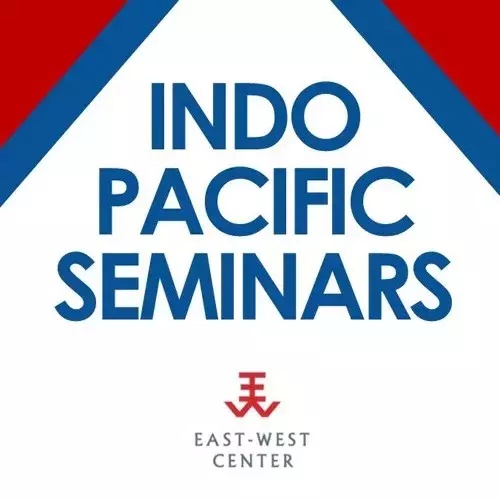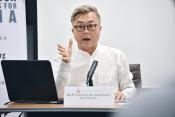Error message

OFFICE/DEPARTMENT
A Military Coup, A Royal Transition, An Election: Thailand’s Domestic and Foreign Trajectories
An Indo-Pacific Foreign Policy and Defense Seminar featuring:
Dr. Pavin Chachavalpongpun
Associate Professor, Center for Southeast Asian Studies,
Kyoto University
Dr. Satu P. Limaye (Moderator)
Vice President, East-West Center &
Director, East West Center in Washington
Thailand has fallen into a deep crisis lasting for more than a decade now. The military staged two coups within a period of eight years, overthrowing two siblings from the Shinawatra family. While the first coup in 2006 was primarily meant to remove

Thaksin from power, the second coup was directly related to the imminent royal succession. For seven decades, Thai political elites relied immensely on the royal dominance of King Bhumibol Adulyadej. But by 2014, Bhumibol was bedridden, creating a sense of anxiety among his supporters in high places. They were anxious about the upcoming new reign under Vajiralongkorn who lacked both charisma and moral authority. The coup in 2014 that toppled Yingluck paved the way for both the continuity of royal dominance and the entrenchment of political power of the military. The political elites rewrote a constitution that would facilitate their staying power. Consequently, the election of 2019 produced the expected result, with General Prayuth Chan-ocha returning to the premiership at the expense of democratization.
Dr. Pavin Chachavalpongpun discussed the current political situation in Thailand and the country’s foreign policy, particularly its relations with the United States and China. He touched upon the impact of the domestic crisis in Thailand on the way in which Thai diplomacy has been conducted in the past and will likely be pursued in the future.
For more images, please visit the album for this event on the East-West Center's Flickr page.
SPEAKER BIOGRAPHIES
Dr. Pavin Chachavalpongpun is an Associate Professor at the Center for Southeast Asian Studies, Kyoto University where he teaches Southeast Asian politics. Earning his PhD from the School of Oriental and African Studies in London, Pavin is the author of A Plastic Nation: The Curse of Thainess in Thai-Burmese Relations and Reinventing Thailand: Thaksin and His Foreign Policy. He is also editor of the two upcoming books, Coup, King, Crisis: Time of a Dangerous Interregnum in Thailand and the Routledge Handbook of Contemporary Thailand. Pavin is a chief editor of the online journal, Kyoto Review of Southeast Asia, in which all articles are translated from English into Japanese, Thai, Bahasa Indonesia, Filipino and Vietnamese. After the coup of 2014, Pavin was summoned for being critical of the Thai military and monarchy. He rejected the summons. As a result, a warrant was issued for his arrest and his passport revoked, forcing him to apply as a refugee with Japan..
Satu Limaye is Vice President of the East-West Center and the Director of the East-West Center in Washington where he created and now directs the Asia Matters for America initiative and edits the Asia Pacific Bulletin. He is also a Senior Advisor at CNA Corp (Center for Naval Analyses) and Senior Fellow on Asia History and Policy at the Foreign Policy Institute at Paul H. Nitze School of International Studies (SAIS). He is a magna cum laude and Phi Beta Kappa graduate of Georgetown University and received his doctorate from Oxford University (Magdalen College) where he was a George C. Marshall Scholar. Dr. Limaye publishes and presents on a range of Indo-Pacific issues. Recent publications include: Raging Waters: China, India, Bangladesh and Brahmaputra River Politics (with Nilanthi Samaranayake and Joel Wuthnow); Why ASEAN is Here to Stay and What that Means for the US; The United States-Japan Alliance and Southeast Asia: Meeting Regional Demands; and Weighted West: The Indian Navy’s New Maritime Strategy, Capabilities, and Diplomacy.
A Military Coup, A Royal Transition, An Election: Thailand’s Domestic and Foreign Trajectories
An Indo-Pacific Foreign Policy and Defense Seminar featuring:
Dr. Pavin Chachavalpongpun
Associate Professor, Center for Southeast Asian Studies,
Kyoto University
Dr. Satu P. Limaye (Moderator)
Vice President, East-West Center &
Director, East West Center in Washington
Thailand has fallen into a deep crisis lasting for more than a decade now. The military staged two coups within a period of eight years, overthrowing two siblings from the Shinawatra family. While the first coup in 2006 was primarily meant to remove

Thaksin from power, the second coup was directly related to the imminent royal succession. For seven decades, Thai political elites relied immensely on the royal dominance of King Bhumibol Adulyadej. But by 2014, Bhumibol was bedridden, creating a sense of anxiety among his supporters in high places. They were anxious about the upcoming new reign under Vajiralongkorn who lacked both charisma and moral authority. The coup in 2014 that toppled Yingluck paved the way for both the continuity of royal dominance and the entrenchment of political power of the military. The political elites rewrote a constitution that would facilitate their staying power. Consequently, the election of 2019 produced the expected result, with General Prayuth Chan-ocha returning to the premiership at the expense of democratization.
Dr. Pavin Chachavalpongpun discussed the current political situation in Thailand and the country’s foreign policy, particularly its relations with the United States and China. He touched upon the impact of the domestic crisis in Thailand on the way in which Thai diplomacy has been conducted in the past and will likely be pursued in the future.
For more images, please visit the album for this event on the East-West Center's Flickr page.
SPEAKER BIOGRAPHIES
Dr. Pavin Chachavalpongpun is an Associate Professor at the Center for Southeast Asian Studies, Kyoto University where he teaches Southeast Asian politics. Earning his PhD from the School of Oriental and African Studies in London, Pavin is the author of A Plastic Nation: The Curse of Thainess in Thai-Burmese Relations and Reinventing Thailand: Thaksin and His Foreign Policy. He is also editor of the two upcoming books, Coup, King, Crisis: Time of a Dangerous Interregnum in Thailand and the Routledge Handbook of Contemporary Thailand. Pavin is a chief editor of the online journal, Kyoto Review of Southeast Asia, in which all articles are translated from English into Japanese, Thai, Bahasa Indonesia, Filipino and Vietnamese. After the coup of 2014, Pavin was summoned for being critical of the Thai military and monarchy. He rejected the summons. As a result, a warrant was issued for his arrest and his passport revoked, forcing him to apply as a refugee with Japan..
Satu Limaye is Vice President of the East-West Center and the Director of the East-West Center in Washington where he created and now directs the Asia Matters for America initiative and edits the Asia Pacific Bulletin. He is also a Senior Advisor at CNA Corp (Center for Naval Analyses) and Senior Fellow on Asia History and Policy at the Foreign Policy Institute at Paul H. Nitze School of International Studies (SAIS). He is a magna cum laude and Phi Beta Kappa graduate of Georgetown University and received his doctorate from Oxford University (Magdalen College) where he was a George C. Marshall Scholar. Dr. Limaye publishes and presents on a range of Indo-Pacific issues. Recent publications include: Raging Waters: China, India, Bangladesh and Brahmaputra River Politics (with Nilanthi Samaranayake and Joel Wuthnow); Why ASEAN is Here to Stay and What that Means for the US; The United States-Japan Alliance and Southeast Asia: Meeting Regional Demands; and Weighted West: The Indian Navy’s New Maritime Strategy, Capabilities, and Diplomacy.









